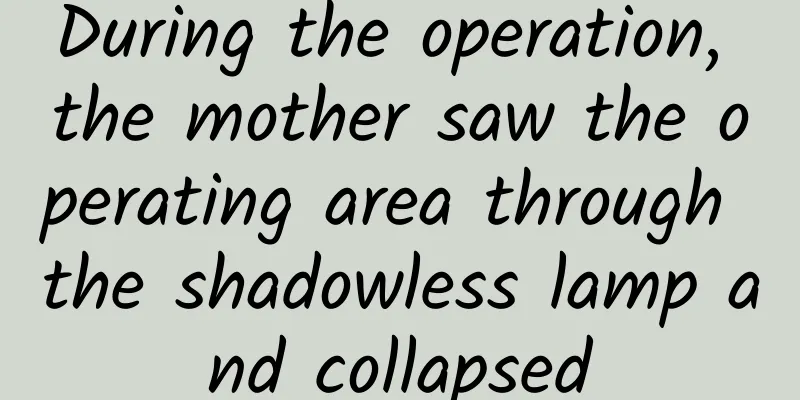During the operation, the mother saw the operating area through the shadowless lamp and collapsed

|
I was on night shift on the fifth day of the Lunar New Year. I thought the hospital would be quiet as everyone was at home for the holiday. However, a cesarean section quietly took place. After receiving the surgery information, we immediately started to prepare. Although there were some complaints, we could not say anything when we thought about the pregnant woman. No one can predict the birth of a child. Once there are signs of labor, no one dares to delay. If it is a routine surgery, almost everyone will try to use conservative methods to delay it until daytime. On the one hand, no one wants to work against the biological clock at night, which is very dangerous; on the other hand, there are more people during the day. If there is a problem, there can also be multidisciplinary rescue. (The picture and text are unrelated) Focus on cooperation The photo is from the 2nd "Renxin Cup Most Beautiful Angels in White Photo Collection Competition" Photographer: Duan Xiaosu To make matters worse, this woman was not having an ordinary cesarean section, but was experiencing fetal heart rate deceleration, which meant that everyone had to race against time to save the life of the fetus. With this information, we have already prepared all the necessary things before the mother even enters the operating room. As long as the "three-party verification" is completed, anesthesia can be given immediately. Over there, disinfection and draping can also be carried out immediately. Although we were on high alert, the woman in labor didn't seem that nervous. Perhaps it was because she had given birth to a child before, and it was a natural birth. As soon as she entered the operating room, she told us: I don't know what happened, why can't I give birth to this baby? We couldn't let her notice our nervousness, so the overall atmosphere of this cesarean section was relatively relaxed. However, when the head of the baby was lifted out by the obstetrics director, the mother suddenly became very frightened, stretched out her arms, and tried desperately to pull her body back. Seeing this, Dr. Gao, who was in charge of anesthesia, immediately held her hand and comforted her: It's okay, the baby will be out soon. According to Dr. Gao's opinion: at that time, the mother might have felt uncomfortable because the obstetrician pressed on her stomach. Here, we need to explain a little: Although cesarean section also uses anesthesia, most of the anesthesia is spinal anesthesia, which is commonly known as "half anesthesia". The characteristic of this anesthesia is that the lower body is anesthetized and the upper body is basically normal. However, if the anesthesia plane is not high enough, the abdominal organs will still have some feeling. When the obstetrician squeezes the abdomen hard and tries to get the baby out of the smallest uterine incision, the mother will usually feel some discomfort. This discomfort is usually short-lived, so the mother is generally asked to hold on. However, the consolation at this time seemed to be of no use. Seeing that the woman's shaking was getting worse and worse, Dr. Gao broke open a sedative and pushed it in. The regular dose seemed to have no effect, so she was given a higher dose and finally "fell asleep". During this sleep, her breathing also stopped. There was no other choice but for Dr. Gao to immediately use a ventilator to assist her breathing. After a few minutes, she slowly opened her eyes and felt as if she were in another world. When asked why, she finally told the truth: It turned out that she saw her surgical incision in the shadowless light above her head. When describing it, she didn't even dare to say it directly. It can be seen how much the incision shocked her at that time. As she spoke, she burst into tears. After some comfort, her emotions finally calmed down a little. However, we were not calm at this moment. Looking up at the shadowless lamp, there was indeed a shadow. However, a special angle was required to see the reflected image. Unfortunately, in the rush to perform the operation, one of the lamps was not aimed at the operation area. If it was aimed at the operation area, its reflective surface would not be facing the parturient's head, and the parturient would not be able to see the operation area. While we felt that we had not done our job well, we were also worried about whether it would leave her with psychological trauma. Before sending her out of the operating room, we counseled her again. In addition, we also told her husband to pay more attention to her. I hope that the care of family affection can heal her psychological trauma this time. [Warm Tips] Follow us, there are a lot of professional medical knowledge here to help you understand the anesthesia issues in surgery~ |
<<: In just 7 days, nearly 300 people were infected! Why do some people just can't stop drinking?
Recommend
EMI: 2018 Teenagers’ Smartphone Addiction Survey Report
Smartphones have become an indispensable device f...
“How Much Do You Know About Nutrition” Series | Do you consume the seven major nutrients that maintain the body’s survival every day?
As we all know, the human body structure is compo...
Cervical cancer squamous cell carcinoma cure rate
Cancer worries everyone because it is more diffic...
Can I drink pigeon soup during late pregnancy?
In fact, pregnant women can drink some light soup...
Can girls lose weight by doing squats?
Nowadays, girls really care about their figure, s...
The family bandaged the wound incorrectly, causing necrosis of the finger of a 3-year-old girl! Please note that bandages should not be used in these cases
Expert in this article: Ao Rongguang, MD, associa...
Lochia recurred after cesarean section
The whole process of pregnancy is like a long mar...
Vitamin B1 is an “essential B” for the human body. Are you supplementing it correctly?
Vitamin B1 is a water-soluble vitamin. Used to pr...
Can salpingography be done on the same day?
When a woman's fallopian tube has a disease, ...
Causes of miscarriage during one week of pregnancy
Most women do not pay attention to their physical...
Yaowa Quiz | Should I supplement vitamin D while taking calcium?
Vitamin D is closely related to calcium absorptio...
What kind of exercise is suitable for menstruation?
If women want to do some exercise during menstrua...
How to cook ginger soup when you have a cold during pregnancy
During pregnancy, women pay great attention to th...
Can the thickness of the inner membrane recover on its own?
Thick endometrium is mainly caused by inflammatio...









